 |
 |
 |
| |
GS9148: A Novel Nucleotide Active Against HIV-1 Variants with Drug Resistance Mutations in Reverse Transcriptase
|
| |
| |
Reported by Jules Levin
13th CROI (Retrovirus Conference), Denver, Feb 6, 2006
T Cihlar,*1 A Ray,1 D Boojamra,1 L Zhang,1 H Hui,1 D Grant,1
K White,1 M Desai,1 N Parkin,2 and R Mackman1
1Gilead Sciences, Foster City, CA
2Monogram Biosciences, So San Francisco, CA
Preliminary pre-clinical data shows GS9148 appears potent and safe, and did not show an effect on mitochondrial DNA; was effective against NRTI-resistant viruses, against the K65R mutation, and viruses with 4-5 mutations.
The presenters concluded that GS9148 exhibits a favorable in vitro pharmacological profile including lower levels of resistance than approved NRTIs, an indication of potential efficacy against existing NRTI-resistant viruses; favorable mitochiondrial toxicity profile; resistance profile superior to any approved N9t)RTI: no resistance due to K65R, M184V, or L74V; minimal reduction in susceptibility due to TAMS; selects for a rare K70E resistance mutation in RT. IN Vivo: favorable PK profile in dogs indicates potential for low-dose QD administration. The amidate prodrug of GS9148 is an attractive candidate for further development with potential for once daily dosing and activity in both treatment-naive and NRTI-experienced patients.
Gilead reported at the CROI meeting on Feb 6, 2006 on a new nucleotide NRTI drug candidate with pre-clinical in vitro data showing efficacy against NRTI drug resistance. GS9148 and its prodrug were subjected to an extensive in vitro evaluation of antiviral potency, toxicity, and resistance. PhenoSense HIV assay was used to compare the activity of GS9148 and 6 approved NRTIs - AZT, ddI, d4T, FTC, abacavir, and tenofovir - against HIV variants with all major types of NRTI-resistance mutations. An ethylalaninyl phenyl ester was identified as a prodrug of GS9148 with the most favorable in vivo pharmacokinetic profile.
The prodrug of GS9148 exhibits potent antiretroviral activity both in primary cells and T cell lines (EC50 = 25 to 200 nM). Low cytotoxicity, potential for toxicity, (CC50 >100uM) was observed in multiple cell types including renal cells. The active diphosphate metabolite of GS9148 acts as an obligatory DNA chain terminator and a competitive inhibitor of HIV-1 reverse transcriptase (Ki = 0.8 uM).
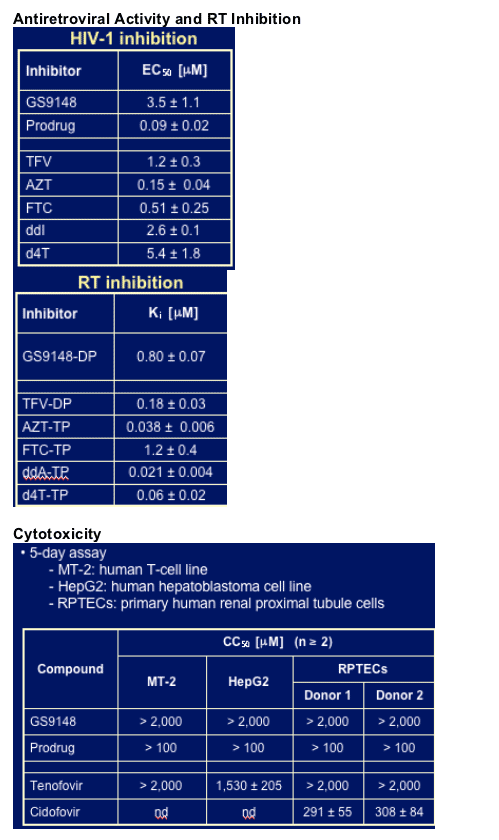
Neither GS9148 nor its prodrug showed an effect on mitochondrial DNA or lactate production in HepG2 liver cells, while ddI, d4T, d4FC, and ddC did exhibit mitochondrial toxicity in this experiment in the test tube.
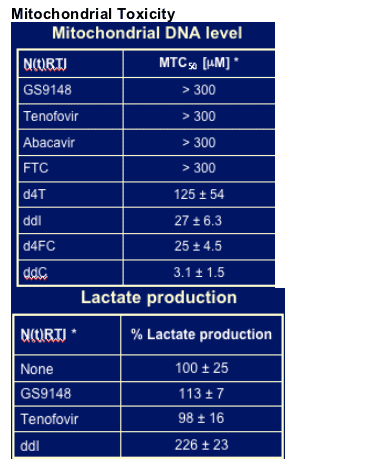
In the phenosense assay, the activity of GS9148 was not affected by the presence of K65R, L74V, M184V, or various combinations (EC50 fold change <1). Viruses with 4 or more thymidine analogue mutations (TAMS) showed 0.74 to 1.31 fold change in the susceptibility to GS9148, a shift that was smaller than any other tested NRTI.
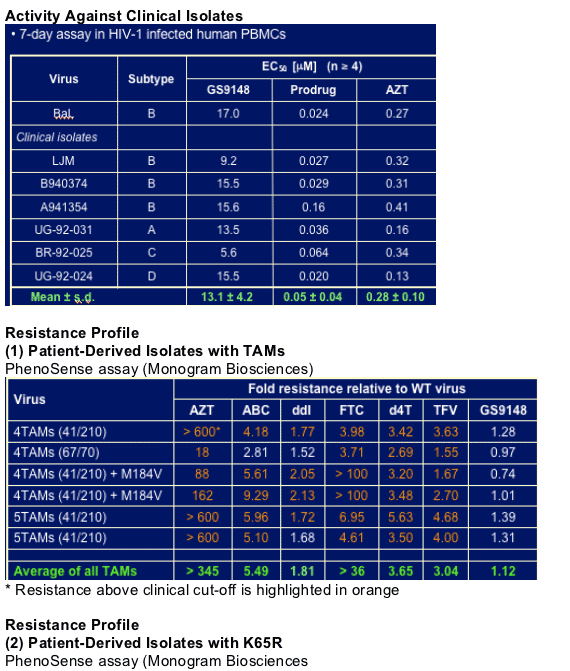
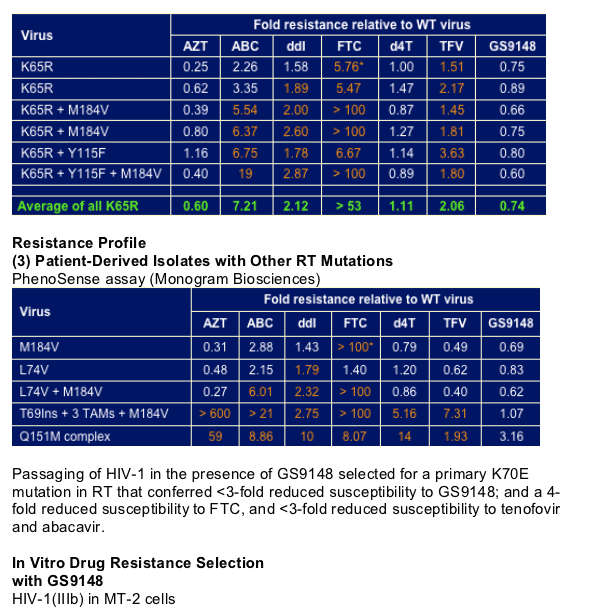
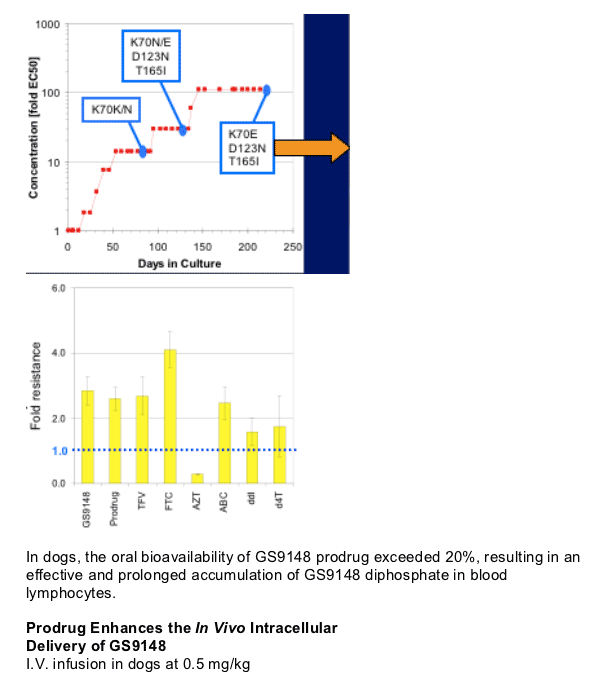
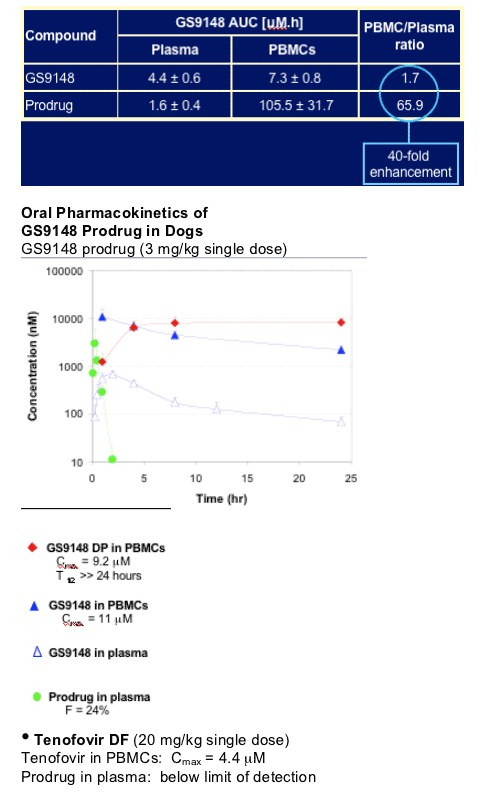
|
|
| |
| |
|
 |
 |
|
|